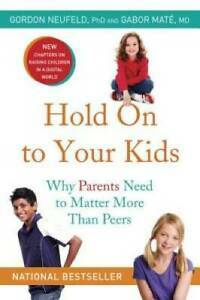You need to sign in or sign up before continuing.
Take a photo of a barcode or cover
198 reviews for:
Hold On to Your Kids: Why Parents Need to Matter More Than Peers
Gabor Maté, Gordon Neufeld
198 reviews for:
Hold On to Your Kids: Why Parents Need to Matter More Than Peers
Gabor Maté, Gordon Neufeld
informative
reflective
slow-paced
Some good info here, but also got a bit repetitive, which made it drag a bit. Good read overall.
I have all kinds of feelings about this book. It has really great suggestions for how parents can strengthen their attachment bonds with their kids, and rightly locates psychological and behavioral problems in broken attachment relationships instead of in kids themselves. But the whole thing relies on moral panic, using a Golden Age argument to denigrate popular culture and digital technologies. It all felt really true and also deeply conservative, wanting to “go back” to a better time when kids were more connected to their parents. I can’t recommend it, but I can see (i.e., I experienced) its appeal.
challenging
informative
slow-paced
I’m walking away with multiple renewed perspectives on attachment, healthy maturation, and the critical importance of invoking a true “village” of adults to help raise confident, secure children. However, the book did have its challenging sections! It’s rather rife with repetition, and it lacked the vitality of their lectures/talks online. I found myself skimming by the end to get to new material around what we can do to help avoid excessive peer orientation.
Overall, though, solid read! New perspectives that totally challenge some of my old beliefs are always a sign of a worthwhile book.
Overall, though, solid read! New perspectives that totally challenge some of my old beliefs are always a sign of a worthwhile book.
It was an interesting thought but I ended up stopping just because they thought that they had found the one problem in our current world. And the problem was restated over and over again page after page chapter after chapter. I decided I didn’t need to hear it 500 more times
This book is chock full of information on attachment, addressing both the problems with attaching to peers and not parents, and discussing ways of switching these two conditions.
The chapters are well laid out, the author uses helpful examples, and the techniques are straightforward. What is likely the most difficult aspect is the timing. It is, of course, easier to establish attachment when kids are younger, rather than trying to catch up when the pees have taken hold.
My only complaint in this book is that there was quite a bit of repetition of concepts. Maybe to drive the pints home? In any case, I was able to pull out the nuggets that were truly valuable to me in my work.
A great textbook on parenting and raising children in our new world order of individuality and peer prioritization.
The chapters are well laid out, the author uses helpful examples, and the techniques are straightforward. What is likely the most difficult aspect is the timing. It is, of course, easier to establish attachment when kids are younger, rather than trying to catch up when the pees have taken hold.
My only complaint in this book is that there was quite a bit of repetition of concepts. Maybe to drive the pints home? In any case, I was able to pull out the nuggets that were truly valuable to me in my work.
A great textbook on parenting and raising children in our new world order of individuality and peer prioritization.
challenging
informative
inspiring
reflective
I read this to get insight into parenting culture rather than specifically for my kids/parenting.
It’s dated.
It’s meta scientific.
It’s playing to parents paranoia about kids forming deep friendships.
Saying all that, there are some seemingly helpful nuggets I took with a generous pinch of salt.
It’s dated.
It’s meta scientific.
It’s playing to parents paranoia about kids forming deep friendships.
Saying all that, there are some seemingly helpful nuggets I took with a generous pinch of salt.
fast-paced
hopeful
informative
inspiring
slow-paced
challenging
informative
inspiring
medium-paced




